November/December 2019
Dear Friends
I hope you are having a joyful holiday season. We have had a wonderful year here at the PiAf Office as we saw the class of 2018-19 complete their fellowships and the class of 2019-20 settle into their host communities. You can see some wonderful highlights of the 2019-20 cohort on our Instagram page. This November, we reviewed the 354 applications we received for the 2020-21 fellowship year. We are already amazed by the impressive range of experiences, skills, and backgrounds that these candidates have and are looking forward to meeting them in January for interviews.
PiAf has experienced many successes this year and we would like to extend our sincere gratitude for your continued support. Wishing you and your loved ones a cheerful holiday season and a happy new year.
PiAf Connections
Please click below to check out pictures of our Fellows, Alums and other members of the PiAf family meeting up at home and around Africa.
Notes from the Field
By Lola Flomen, '19-'20 Fellow with Population Services International in Cote d'Ivoire
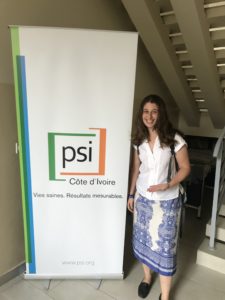
Lola at the office
« Tu es une bonne blanche » (you are a good white) said Monsieur Fofana, a taxi driver who I had come to befriend over my past six weeks living in Abidjan, Côte d’Ivoire. While I like to think that I am a relatively kind person, he was not referring to any character trait. Monsieur Fofana’s designation is significant; it is a poignant snapshot of my racial and national privileges within the Ivorien context.“Good white” is a nickname Ivoriens gift Canadians as a nod to my country’s lack of memorable colonial history on the African continent. No matter how many conversations I have with Fofana and my Ivorien colleagues about ‘bad white Canadians’ (besides Justin Bieber), and my nation’s dark-red history of mass enslavement and murder of First Nations populations, my beneficial title remains indelible. My experience therefore begs the question: if and how, it is possible to spend the rest of my fellowship earning my given pedestal? Or, in other words, what does it mean for me to be an accountable Fellow?
As the Reproductive and Regional Evidence Fellow for Population Services International (PSI), ‘accountability’ appears to be the latest buzzword lacking a concrete definition. For me, being an accountable Fellow means recognizing my conferred power within the organization and with beneficiaries while insuring there are checks and balances for this power. It is about being an advocate for an incredible, hardworking local intern, while also knowing when to stay in the office to prevent taking away from the findings of a field visit because of the novelty of my race. Where I have always struggled is understanding the reciprocity aspect of accountability: is it possible to give back to my Ivorian host community as much as I am taking from them? According to renowned humanitarian accountability pundit, Barbara Harrell-Bond, the relationship between givers and beneficiaries will never be equal. Knowing that I will never be able to give back as much as I have taken as a foreigner, I have learned a few lessons on how, at least in my perception of it, to lessen this rift. I have come to realize that accountability is balancing your relationship between your host organization, the organization’s beneficiaries, and your larger community.
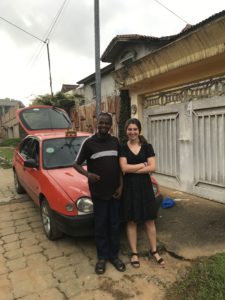
Lola with Monsieur Fofana
PSI has taught me that accountability is not simply reaching health targets within interventions. Working on the regional evidence team, I have learned that attaining a 30% modern contraception prevalence rate is not the ultimate success, but working to understand why the remaining 70% cannot or will not access family planning is more important. In this capacity, PSI is a unique NGO in that its accountability is weighted more towards its beneficiaries than to donors. I have been privileged to write ‘journey maps’ for women seeking emergency contraception and medical abortion care across Côte d’Ivoire, Benin, and Burkina Faso to uncover barriers and facilitators to better PSI’s family planning programming. My supervisor has taught me that it is not enough to just monitor an intervention, rather we must build capacity of teams on the ground to complete their own evaluations. I have had the opportunity to learn how to use SurveyCTO and to Skype teams on the ground in Cameroon to help them with the platform.
My interactions with beneficiaries of PSI has taught me that they are the best-positioned to diagnose, decide, design and evaluate their own health interventions. I have been privileged to assist the research team in setting up a study to better understand HIV stigma within the gendarmerie in Côte d’Ivoire. Guided by PSI, members of the gendarmerie created the research questionnaires themselves and generated a community-driven, door-to-door awareness campaign targeting families and children of the gendarmerie. Beneficiaries have also taught me to dive deeper into their satisfaction with PSI services. While PSI has given them a family planning method, I now know to ask if they are truly happy with their choice or if they are likely to recommend this method to a friend. To this end, I am looking forward to helping PSI HQ organize a client satisfaction workshop in Francophone West Africa in the new year.
My friend, Fofana, has taught me that part of being accountable is to live in the present. With Presidential elections looming in October 2020 and the uncertainty of my host community’s future, I have realized that the best thing I can do for them is to celebrate their current successes. I have been assisting Fofana with budgeting and making payment plans so that he can send himself to a political communication institute next month.
But there is still much to be done – I am looking forward to helping my team improve the ways in which results are reported back to the communities we serve. I am interested in understanding the limits of measuring beneficiary satisfaction. I am learning and growing every day.
Notes from the Field
By Sarah Rooney, '19-'20 Fellow with Baylor International Pediatric AIDS Initiative in Botswana
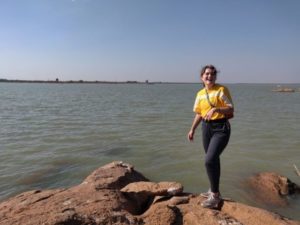
Sarah at the Gaborone Dam!
My name is Sarah Rooney, and I am the 2019-2020 Princeton in Africa Fellow for the Botswana-Baylor Children’s Clinical Center of Excellence in Gaborone, Botswana. It is the beginning of my 4th month here in Gaborone working on adolescent programmes for Botswana-Baylor. As of this week, I’ve coordinated 6 Tutoring sessions, 7 Teen Clubs, and 3 Teen Leaders sessions.
The program which I have been dedicating the most time to in my three months here is the Teen Club, as I am helping to launch and coordinate a new national Teen Club, a program focused on peer-support and education to HIV+ adolescents on holistic health and well-being, including of course HIV care. So far, I have coordinated Teen Club sessions on topics including Adherence to ARVs, Self-Care, Gender and Sexuality, Self-Confidence and Leadership, and Career Day.
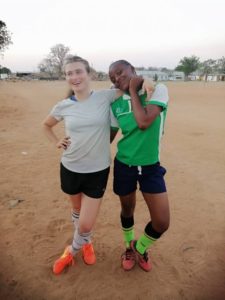
Sarah and Nondi, the Captain of her soccer team, at their practice field for training.She’s been training with a local team, the Prisons Ladies Football Club, every week day.
I loved working on the Gender and Sexuality Teen Club topic, as LGBTQIA+ rights are a rising discussion here in Botswana, and the topic provided for a very lively discussion by the teens. So far, I am really proud of my work designing curricula for Teen Clubs, as well as my work with the Teen Leaders. Teen Leaders are a group of 10 teens, elected by their peers during Teen Club, to help plan sessions, mentor their peers, and provide an example of good adherence and encouragement in fighting the stigma of HIV. Most recently, I organized a Leadership Training for the Teen Leaders that was a huge success. I was excited to put together a workshop that the Teens specifically asked for. The Teen Leaders do a lot of work for Teen Club, as often they are way better at communicating with the rest of the teens, energizing them, and handling disputes than I am. They asked for trainings in return, on various skills that can help them better their ability to lead their peers. I have other sessions planned on facilitation, mentorship, and advocacy, and am really excited for the trainings to continue developing!
To say the very least, working on all these different programs with so many youth has been hectic. I was feeling a bit overwhelmed with the weight of it all, but as I’ve gained more control over the structures and processes of how things work, and have been working to build out SOP’s and strengthen organization, things have become less stressful. These challenges, however, have reminded me why I applied for this role- to learn how to manage projects, design curricula, and facilitate programs for youth. While the stress of working on multiple programs can get to me at times, I’ve been stepping back and remembering how grateful I am to have these learning experiences in the first place. I am so grateful for all that I have been exposed to and am learning in this position, and look forward to strengthening my relationships with the youth and adolescents I work with, and building out the programs to best serve their needs.
Notes from the Field
By Julia Higgins, '19-'20 Fellow with Lwala Community Alliance in Kenya
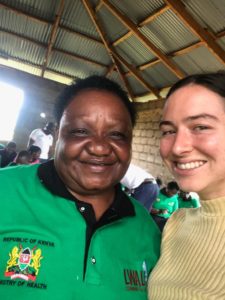
Julia and Lwala Community Health Worker, Caroline, after a training session on enrolling pregnant mothers in the organization’s electronic data collection system.
Amosi from Nyanza Province, Kenya! My name is Julia, and for the last three months, I’ve been serving as the Research and Technology Systems Fellow at Lwala Community Alliance, a maternal and child health non-governmental organization based in rural Western Kenya. One of the most rewarding things about working for Lwala has been supporting a health movement that is truly community-led: the organization was started in 2007, when village members organized and donated land and resources to build their region’s first health clinic. Lwala’s grassroots origins are reflected in the organization’s work today, with the backbone of our health service provision remaining community members themselves. Lwala has expanded significantly since its founding, and now operates programs in nutrition, education, economic development, and more, though a focal point for my role has been supporting our community health program.
It’s been a particularly exciting week here in the village – the monitoring and evaluation (M&E) and community health teams are in the midst of rolling out our expansion to a new service area, South Kamagambo. This means that through the hard work of community health workers (CHWs) and traditional birth attendants (TBAs), 30,000 additional residents in Migori County will gain access to vital health services. For the last five days, I have been in the field supporting training for our CHWs and TBAs; operationally, this has required sensitizing the use of tablets to collect electronic data, ensuring smooth integration of new instrument components required by the Kenyan Ministry of Health, and taking additional steps to ensure both high quality service provision and data.
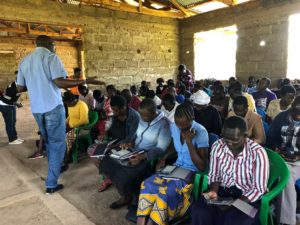
Anthony, Lwala’s M&E Information Systems Manager, facilitating a tablet training session for CHWs
Once trained, the workers will be deployed to their villages to start electronically enrolling households and individuals in their home communities, with the end goal of increasing health access. CHWs’ wide breadth of responsibilities include actions such as administering malaria home tests, delivering pharmaceuticals and contraceptives, and making referrals to nearby health clinics. In addition to facilitating community-led health service provision, the deployment of CHWs also helps Lwala’s M&E team track our programmatic impact over time – by having access to real time data, we are able to continuously report on key indicators, from the number of fully immunized children to the percentage of pregnant women in Lwala’s service areas who received antenatal care prior to their delivery date. In our current service areas, for example, we have observed a 73% reduction in infant deaths since Lwala’s intervention, and hope to replicate similar outcomes in South Kamagambo.
In tandem with training roll-out, we also launched data collection for a survey designed to assess empathy, literacy, supervision, and danger sign knowledge among CHWs and TBAs. Our research objective is to identify key characteristics that are correlated with high performance in the health worker context, and use the findings to inform Lwala programming down the line.
As I reflect on the week at the close of day five of training and surveying, I am feeling accomplished, tired, and grateful for this experience. ‘Til next time!
Notes from the Field
By Rachel Swartz, '19-'20 Fellow with the International Rescue Committee in Kenya
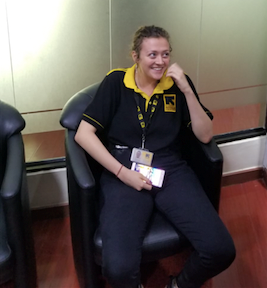
Rachel at the IRC Office in Nairobi
Hi PiAF Family!
My day to day life as the Grants in Programs Fellow consists of managing the reporting of our grant portfolio and ongoing projects, assisting in proposal development and coordination, and leading the communications efforts for the Country Program. In the month of September I went on my first trip to our field offices at the Kakuma Refugee Camp. I went there to do grants capacity building and deliver a workshop on the importance of media and storytelling. The highlight of the trip however was getting to meet the amazing staff we have working in the field.
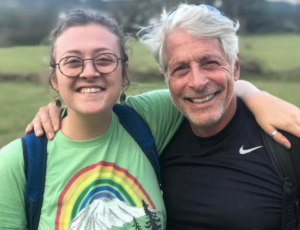
Rachel and her father in Nairobi
Now that I am close to the 5-month mark, I have had time to reflect on my experience thus far. I have really enjoyed exploring Nairobi with the people I have met; from Karura forest to every brunch place in the city, there is never a lack of things to do. Nairobi has an amazing and completely under-rated culinary scene, my supervisor called it “the best culinary city she’s ever been to.” Sometimes, however, you have to get out of the city. When my dad was in town, a few other Fellows and I went to Naivasha for the day and toured around Hells Gate National Park on bikes since it is the only national park in Kenya with no predatory animals – so you can walk/bike without fear of lions roaming.




